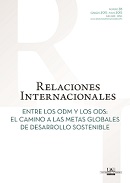Alternative Assessment of Poverty Indicators in the MDGs for Latin America and the Caribbean: Measuring Success as Accelerating Progress or Achievement of Targets?
Keywords:
Millennium Development Goals , poverty, Latin America and the Caribbean , capabilities , comparative politicsCopyright (c) 2015 Gibrán CRUZ-MARTÍNEZ

This work is licensed under a Creative Commons Attribution-NonCommercial-NoDerivatives 4.0 International License.
Abstract
Several researchers have criticized the MDGs because of the arbitrariness in the formulation and goal setting, as well as in the use of indicators that may affect the perspective of success exhibited by a country or region, favouring some and hurting others. The main purpose of this paper is to conduct a critical alternative assessment of the success on poverty reduction in 38 countries of Latin America and the Caribbean. Using positive and negative indicators, the results on (1) the achievement of the official 1.A and 7.C MDG targets and (2) the accelerating progress on the reduction of poverty rates were contrasted in 4 periods between 1980-2015. Two poverty indicators were used to evaluate the target 1.A – half the proportion of people whose income is less than 1,25 dollars (PPP) per day- and the target 7.C –half the proportion of the population without sustainable access to safe drinking water and basic sanitation. The findings confirm some of the criticism made of the MDGs. The use of negative indicators and the conceptualization of success as accelerating the progress on poverty reduction show a more favourable image of the region.





